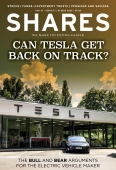Archived article
Please note that tax, investment, pension and ISA rules can change and the information and any views contained in this article may now be inaccurate.
Revealed: the trusts which did best through tariff turbulence

The period since ‘Liberation Day’ – when the Trump administration announced sweeping reciprocal tariffs – has been extremely volatile and ultimately negative for financial markets.
This is reflected in the average performance of the investment trust universe which, excluding VCTs, comes in at -1.9% based on Shares analysis of Sharescope data up until 24 April. It is no surprise to see vehicles investing in China and Vietnam under the cosh given their tariff exposure, as well as global investors with significant US holdings and North American specialists. However, some trusts have held up well and even thrived during this period.
You can see the table of top performers for yourself but there are some interesting themes which stand out from the data. Given tariff uncertainty is not going away, their robust showing may offer some clue to their future performance, although obviously no guarantees.
A collection of trusts, notable for their absence in the group of outperformers, are the capital preservation specialists – Capital Gearing Trust (CGT), Personal Assets Trust (PNL) and Ruffer Investment Company (RICA). While they have not necessarily shone that brightly through the recent market turbulence the accompanying chart suggests they have at least behaved as they ought to based on their remit. Compared with the MSCI World, which has seen some significant ups and downs, these names have comparably been much more steady.
INFRASTRUCTURE AND RENEWABLES IN DEMAND
Perhaps the biggest detectable overarching theme in terms of the winners is the strong representation for renewables and infrastructure trusts.
This may reflect an improved sentiment towards the sector in general, something we flagged at the end of February. These trusts were trading on heavy discounts thanks to the increase in interest rates since 2022, which increased their borrowing costs, but also the appeal of alternative assets like cash and government bonds.
Recent M&A in the sector has been a catalyst but it cannot have hurt during the last four weeks that these are long-term, often highly important, assets offering a stream of inflation-linked income with limited exposure to the day-to-day vagaries of global trade. The potential for interest rate cuts as central banks look to cushion the economic impact of tariffs could also be a supportive factor.
PROPERTY GETS A BOOST
This dynamic also seems to be helping real estate investment trusts (REITs for short) with more niche names like Social Housing REIT (SOHO), which recently appointed Atrato Partners as its new investment manager, and Target Healthcare REIT (THRL), whose main UK-listed counterpart Care REIT (CARE) received a successful bid in mid-March, among those to stand out. Another, Urban Logistics REIT (SHED), is subject to a £476 million bid from LondonMetric (LMP), helping to explain its place in the leaderboard. While TR Property Investment Trust (TRY), which has a broader remit, has also performed creditably.
Perhaps more surprising is the presence of two Japanese trusts in the list – given the headline Nikkei 225 index is flat to slightly lower over that period. Nippon Active Value Fund (NAVF) unveiled robust results on 8 April.
A rare global fund which has performed well is Lindsell Train (LTI) which has benefited compared with its rival trusts thanks to a relatively lowly allocation towards the US market. According to figures for the end of March, Lindsell Train went into Liberation Day with an 18.1% allocation to US stocks, both directly and through fund and trust holdings, compared with a weighting for American shares of more than 70% in the MSCI World Index.
A BENEFICIARY OF VOLATILITY
Hedge fund Brevan Howard combines macro-economic research with strict risk management. Its BH Macro Fund (BHMG) has a history of outperforming in bear markets and during foreign exchange and interest rate volatility and therefore it’s no great surprise to see this trust outperformed the wider market during the recent ups and downs.
However, it is worth noting BH Macro charges higher fees than traditional funds, with ongoing charges of 2.21% according to the Association of Investment Companies, can underperform at times, and its positions are often hard to decipher. Muted foreign exchange and interest rate volatility left the shares largely stagnant for much of the 2010s.
Important information:
These articles are provided by Shares magazine which is published by AJ Bell Media, a part of AJ Bell. Shares is not written by AJ Bell.
Shares is provided for your general information and use and is not a personal recommendation to invest. It is not intended to be relied upon by you in making or not making any investment decisions. The investments referred to in these articles will not be suitable for all investors. If in doubt please seek appropriate independent financial advice.
Investors acting on the information in these articles do so at their own risk and AJ Bell Media and its staff do not accept liability for losses suffered by investors as a result of their investment decisions.
Issue contents
Feature
Great Ideas
Investment Trusts
News
- Investors eagerly await Berkshire Hathaway's Q1 and annual meeting on 3 May
- The US could be in for an unprecedented supply shock
- Imperial Brands shares hit a five-year high as investors dial down risk
- ITV receives takeover interest from French media giant Banjay
- Associated British Foods’ first-half results send shares skidding
- Winking Studios shares nearly halve year-to-date after IPO excitement
 magazine
magazine








